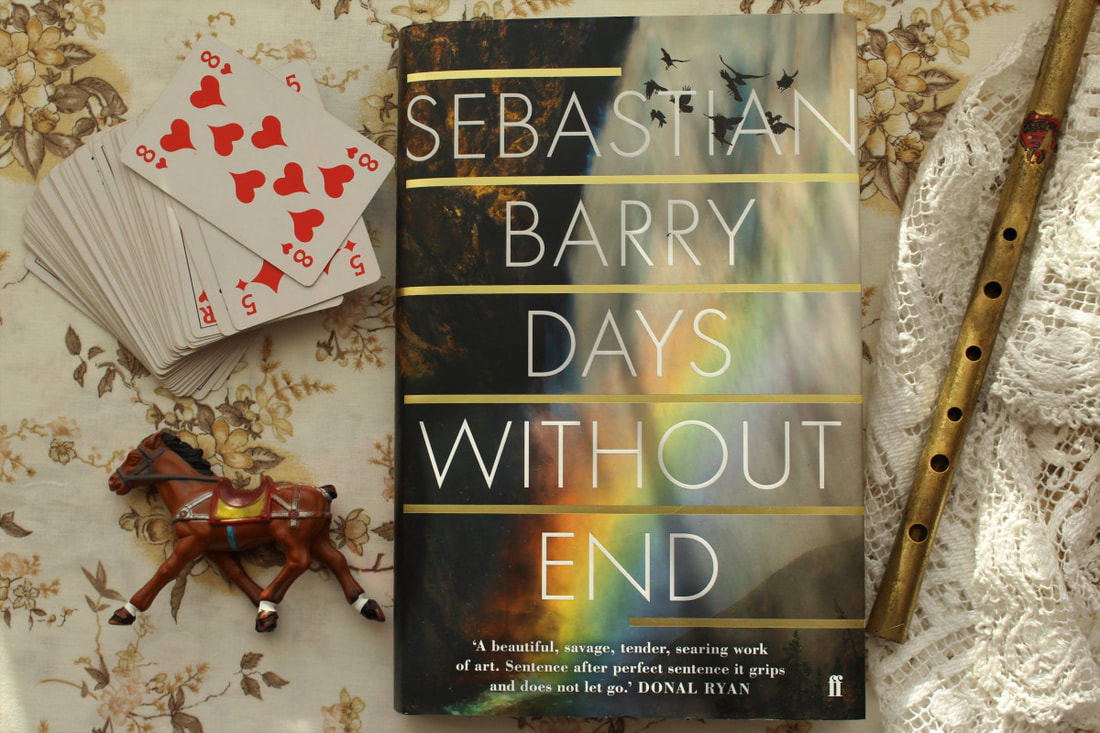|
Irish writer Sebastian Barry won the 2017 Costa Book of the Year Award for "Days Without End," a novel judges described as “one of the most wonderful depictions of love in the whole of fiction.” Barry is the first novelist to win the prestigious award for a second time, after winning in 2008 for "The Second Scripture," another of Barry’s four novels that feature a member of the McNulty clan. Barry’s seven novels imagine the people in his ancestral family that were never discussed. As a child he discovered there had been a great-uncle who had fought in the Indian Wars. At age 8, he equated that story with the cowboy films he watched in Dun Laoghaire. But the story grew in his mind, as he contemplated for 50 years, imagining the sorrow of a person having to leave Ireland and consequentially fight for the removal and erasure of another native people from their own home. I’ve been hungry for the style and lyricism of which Barry appears to be a master. I found the author and the title from a list of notable reads assembled by the American Library Association. The subject matter of the novel intrigued me; its narrator Thomas McNulty, a teenage crack shot, has fled the Great Famine of Ireland and been swiftly conscripted into the U.S. Army, shuttled off to the great plains of Wyoming to fight in a blue uniform against the Sioux and the Yurok. Thomas traverses the states to Tennessee to later enter the Civil War. “Everything bad gets shot at in America ... and everything good too.” I marveled at how directly and colloquially Barry describes the famine and brutality of his circumstances while also finding heartbreaking beauty in the nature and companionship that accompanies his journey. “The mules treading along so mulish graceful and only their choosy footfall sounding. Otherwise the usual full sounds of night. Something cracking through the wood, bear or elk maybe. Maybe the wolves come hungrily through the brush. The sky is just beaten silver now too and the moon alters his light a shade to make sure he seen … We been through many slaughters, John Cole and me. But I am as peaceful and easy now as I ever been. Fear flies off and my box of thoughts feels light. I’m thinking, John Cole looks big for the mule … like the mule and him ain’t in the same world exactly. Then he pulls his hat down tight. Ain’t nothing in it. He pulls his hatbrim down, under the moon. With the dark trees around. And the owls. Don’t mean nothing. Be hard to be in the world without him. I’m thinking that. That part of the country you see two or three shooting stars a minute. Must be time of year for shooting stars. Looking for each other, like everything is.” These capacious architectural passages left me heartstruck. And Barry’s visceral storytelling had me completely hooked, well before I realized this was more than a retelling of our nation’s fateful beginnings or its violence past, but rather a book of steadfast love. Thomas McNulty finds a friend and lover with brother in arms, “handsome John Cole.” These men are complicit in the horrors that shape American history and yet also form a devoted family, defending and caretaking a young Sioux girl and reaching out for one another with unyielding tenderness. Their bond to one another and to their makeshift family requires the kind of courage and tenacity that defines integrity. Thomas claims “there is a seam in men called justice that nothing burns off complete.” The author’s own son Toby came out to him a few years ago, and Barry describes how capable and delicate is the love between Toby and his boyfriend that it served as inspiration for the love between Thomas and Cole. Barry deftly and convincingly captures the development of their relationship as it persists through great hardship and the complexities of war. “How come we lying here and guarded and inside four walls and the camp lying within this wooded land and the dogs of winter biting and scraping at our limbs? … Got to say it is a marvel how the mortal bones stand out. I can see his hip bones and his leg bones where they thicken at the knees. His arms just whittled branches from a dried-out tree. Long hours we lie close and John Cole lays his hand on my head and leaves it there. John Cole, my beau.” Actor Aidan Kelly brogues the audio book narration of this novel, earnestly and wittily delivering the wonder of Barry’s prose. Definitively worth a listen. Originally posted in the Aspen Daily News, May 24, 2018
20 Comments
1/2/2022 06:11:07 am
I’m glad the study was not complicated to read, as well as the fact that the facts are written clearly. I would like to be informed when a new post is posted
Reply
1/2/2022 11:12:27 pm
helpful info you supply to your articles.I will bookmark your weblog and check once more here regularly.
Reply
1/9/2022 06:05:15 am
I’m glad the study was not complicated to read, as well as the fact that the facts are written clearly.
Reply
4/30/2022 08:15:21 pm
Very useful article for Freelance Engineers. Keep share articles like this
Reply
6/11/2022 09:23:50 pm
genuinely pleased to read this blog posts which contains tons of valuable facts, thanks for providing these kinds of statistics
Reply
8/8/2022 01:32:36 am
Pretty! This has been a really wonderful post.Thank you for supplying this info.
Reply
8/29/2022 09:08:35 am
.I do enjoy writing but it just seems like the first 10 to 15 minutes are usually lost just trying Nice and Informative Post. This article is really contains lot more information about This Topic
Reply
9/22/2022 02:16:20 am
awesome blog format! How long have you been running a blog for? you make blogging glance easy. The entire glance of your website is magnificent, let alone the content material!
Reply
9/28/2022 08:56:34 am
I know your expertise on this. I must say we should have an online discussion on this. Writing only comments will close the discussion straight away! And will restrict the benefits from this information.<a href="https://rollcallgunshop.com/product/17-hmr-ammo/" rel="dofollow">17 hmr ammo for sale</a>
Reply
12/4/2022 05:01:44 am
supply to your articles.I will bookmark your weblog and check once more here regularly.
Reply
12/7/2022 12:26:36 am
desire to increase your familiarity just keep visiting this web site and be updated with the most recent news update posted here.
Reply
12/24/2022 10:45:13 pm
study was not complicated to read, as well as the fact that the facts are written clearly. I would like to be informed when a new post is posted
Reply
1/8/2023 07:40:15 am
if you knew where I could locate a captcha plugin for my comment form? I’m using the same blog platform as yours and I’m having problems finding one? Thanks a lot!
Reply
1/10/2023 10:46:19 am
I just couldn't leave your website before telling you that I truly enjoyed the top quality info you present to your visitors? Will be back again frequently to check up on new posts.
Reply
4/12/2023 07:33:50 pm
it opens up an extremely flaming world of Drift Hunters.
Reply
Your comment will be posted after it is approved.
Leave a Reply. |
Adult News & reviewsLibrary news, info about upcoming events, reviews of books and films, and a look at the topics that affect us as a library. Archives
July 2023
|
General |
Borrowing |
About |


 RSS Feed
RSS Feed
